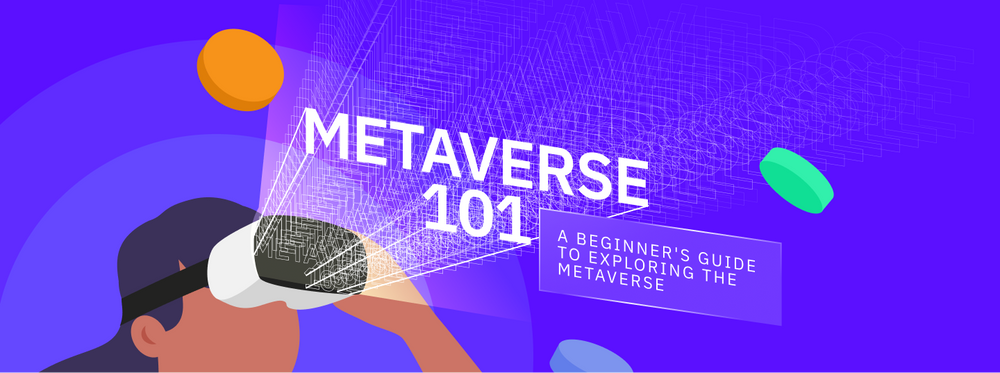METAVERSE 101 - A Beginner's Guide to Exploring the Metaverse
What is the Metaverse? Since Facebook CEO Zuckerberg changed the name of the social media company to Meta back in October 2021, the term quickly became a buzzword among tech enthusiasts.
But what exactly is it? Can it deliver on its promises? And why are big businesses investing in it? If you’re interested in knowing the answers to these questions but want to spare yourself from the technical jargons and boring explanations, you’re in luck: here’s an easy-to-understand guide on the basic facts and most recent updates about the Metaverse.
Who came up with the term Metaverse?
“Metaverse” is a term coined by author Neal Stephenson and which first appeared in his 1992 science fiction novel “Snow Crash”. It combines the word “meta” (which means beyond) and “universe”, and was used in the novel to describe a 3D virtual world inhabited by avatars of real people.
Are there other moments in pop culture history that predicted or imagined the Metaverse?
Yes. Many films, including Avatar, Ready Player One, and The Matrix, make reference to the Metaverse. Second Life, an online game launched in 2003 by Linden Lab, is also credited with being the first metaverse.
What is the modern-day definition of the Metaverse?
Today, the term Metaverse is used to describe “a simulated digital environment that uses augmented reality (AR), virtual reality (VR), and blockchain, along with concepts from social media, to create spaces for rich user interaction mimicking the real world.”

However, during an interview, Facebook CEO Mark Zuckerberg explained that “A lot of people think that the Metaverse is about a place, but one definition of this is it's about a time when basically immersive digital worlds become the primary way that we live our lives and spend our time".
What’s the connection between Web3 and the Metaverse?
A simple definition of Web3 is that it is the third generation of the evolution of web technologies –– so to say, an evolutionary next step of the internet we know today. Certainly, the Metaverse is a result of that evolution, and it's a new technology that focuses on how users will experience Web3.
Is there only one Metaverse or many?
There are many Metaverses (platforms) and different types of Metaverse:
- Traditional Centralized Metaverse: these are Web2 metaverses that do not integrate blockchain technology and are centralized. As such, it is simply a virtual space that is controlled by a central organization. Some examples are Roblox and Minecraft.
- Centralized Blockchain Metaverse: these metaverses integrate blockchain and allow users to interact and monetize their creations or acquisitions creations. However, it is still controlled by a centralized organization. An example is Meta’s Horizon Worlds.
- Decentralized Blockchain Metaverse: these metaverses are based on a system called DAO (Decentralized Autonomous Organization) and where users have decision-making power and administrational roles. Some examples are Decentraland and Axie Infinity.
What promises does the Metaverse hold?
Experts and proponents argue that the Metaverse could transform the way we work, socialize and conduct business as it holds promise for the next generation of digital experience, immersion and connectivity.
As for the specific benefits that the Metaverse offers, data company Statista created a list in 2021 of how it can benefit the world, which includes overcoming obstacles to daily living (such as disabilities), enhancing creativity and imagination, and increasing technological literacy and skills.
What does the future hold for the Metaverse?
In a recent study, economic consulting firm Analysis Group predicted that if the Metaverse takes off like mobile technology has, it could contribute $3 trillion (€2.8 trillion) to the global economy within a decade.
The study also said that “the metaverse is expected to have far-reaching applications to society: transforming economic sectors such as education, health care, manufacturing, job training, communications, entertainment, and retail.”
As a result, companies continue to invest in the Metaverse. In the same way, many countries have expressed excitement over its development.
Cake DeFi’s Metaverse ambitions
As a company that prides itself as being highly-innovative, forward-looking and at the forefront of shaping the future of the crypto space, we at Cake DeFi recognize the potential benefit of the Metaverse to the world and the amazing opportunities that it presents to forward-thinking individuals and institutions.
As such, we announced earlier this year the launch of Cake DeFi Ventures –– our venture capital arm, with US$100 million, earmarked for metaverse projects and other tech startups to support Cake DeFi’s mission to bring DeFi services to the masses.
Cake DeFi Ventures is also looking to invest in startups that are involved in Web3, gaming, fintech, NFT, blockchain, e-sports and relevant industries that will bring synergistic value to Cake DeFi’s core business.
So, if you have a cool project to recommend or have enquiries about Cake DeFi Ventures, please visit cakedefi.vc. We look forward to hearing from you and seeing everyone soon in the Metaverse!

